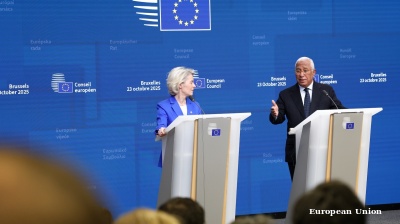The Ukrainian economy is going through a typical V-shaped recovery – a 11.4% year-on-year drop in 2Q narrowed to c. 5% y/y decline in 3Q, according to SP Advisors, a Kyiv-based investment boutique that is a veteran of investing into Ukraine.
In what is a typical pattern for the Ukrainian economy, strong household demand was the key factor that reversed the trend.
Household demand is holding up surprisingly well, supported by very healthy growth in incomes. Average real salaries grew 9.7% y/y in September, meaning the pace of growth is now back to pre-crisis levels. Retail sales grew an impressive 10.4% y/y in September (+6.4% in 9M20).
With imports down considerably, domestic production is enjoying stronger internal demand. The external trade environment has also been favourable for the recovery. Global iron ore, steel and agricultural produce prices have been high YTD, which has supported Ukrainian producers.
Nevertheless, some sectors remain weak – passenger and cargo transportation, industrial production and many types of services are down, and remind us that the crisis is still far from being over.
Agricultural output is also down, but that is purely due to adverse weather conditions that affected crop yields.
The economy is poised to grow by more than 4% in 2021, under our estimates, as long as no new harsh lockdowns are put in place and Ukraine restores its co-operation with international financial institutions (IFIs). The IFIs have been instrumental in maintaining internal and foreign investor confidence and in helping ensure policy continuity. However, that co-operation is no longer guaranteed, and Ukraine will have to work hard to resume its partnerships.
Monetary and FX policies unchanged so far
The National Bank of Ukraine (NBU) has kept key rates unchanged since June, even though inflation has remained below the NBU’s target range (5% +/- 1pp) since the start of the year. With only one monetary policy committee meeting left for 2020 and given its current forward guidance, we expect the NBU’s key policy rate will stay unchanged at 6% at least until late January 2021. However, the chances are high that the key rate will be increased in 1Q21 as inflationary pressures are likely to build due to robust domestic demand.
While inflation was low at 2.6% y/y in October (up from 2.3% in September), it is expected to accelerate in the coming months against last year’s low base.
Rates on bank deposits and loans have fallen significantly over the last year. Deposit rates are now at historical lows and loan rates are also trending down, although with a lag.
The FX market has been quite volatile over the past three months and mild depreciation pressures have prevailed. The hryvnia has depreciated moderately since June (c. 5%); that move has had minimal impact on market sentiment.
This stands in contrast to past years, when even short-term episodes of hryvnia weakening triggered FX market turbulence.
The NBU has reconfirmed its commitment to maintain a flexible exchange rate regime, which has served the Ukrainian economy well over the past few years. The NBU’s presence in the FX market remains limited. The NBU’s reserves are healthy at $26.1bn (4+ months of imports) as of end-September, even though they declined from $29bn at end-August due to external debt repayments.
Co-operation with IFIs stalls posing risks to 2021 recovery
Ukraine’s work with the International Monetary Fund (IMF) and other IFIs is at its lowest level in more than two years. Problems have built through the summer following the resignation of the NBU governor due to alleged political pressure.
The biggest obstacle now is a reversal of anti-corruption reforms following the decision by the Constitutional Court to abolish mandatory declaration of incomes and wealth for government officials. That requirement was an important commitment that Ukraine undertook under various co-operation programmes with IFIs and under the visa-free framework with the EU.
As of now, the authorities are weighing different options to restore the measure, but it is currently not clear when and how the revoked legislation will be reintroduced by Parliament. There are numerous other reform setbacks that worry IFIs: no efforts to prosecute the former owners of Privatbank, no progress in judicial reform, little transparency in the latest top-level appointments.
Financial support from IFIs is not critical for the next couple of months or quarters – Ukraine can manage by reducing budget expenditures, while external debt coming due remains manageable for 4Q20 and 1Q21. However, the longer-term prospects look bleak without active support from the IFIs. External debt rollover will become more expensive, soft fiscal policies to support economic recovery will not be possible, and a gradual erosion of NBU reserves may cause nervousness among businesses and individuals. With this in mind, we believe the authorities will double their efforts to resume co-operation with IFIs.
Opinion

Don’t be fooled, Northern Cyprus’ new president is no opponent of Erdogan, says academic
Turkey’s powers-that-be said to have anticipated that Tufan Erhurman will pose no major threat.

COMMENT: Hungary’s investment slump shows signs of bottoming, but EU tensions still cast a long shadow
Hungary’s economy has fallen behind its Central European peers in recent years, and the root of this underperformance lies in a sharp and protracted collapse in investment. But a possible change of government next year could change things.

IMF: Global economic outlook shows modest change amid policy shifts and complex forces
Dialing down uncertainty, reducing vulnerabilities, and investing in innovation can help deliver durable economic gains.

COMMENT: China’s new export controls are narrower than first appears
A closer inspection suggests that the scope of China’s new controls on rare earths is narrower than many had initially feared. But they still give officials plenty of leverage over global supply chains, according to Capital Economics.




